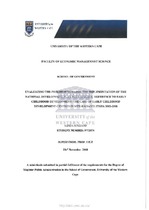Evaluating the progress towards the implementation of the National Development Plan with specific reference to early childhood development: The case of early childhood development centres in Site-B Khayelitsha 2012-2018
Abstract
The historic social and economic inequalities had a negative impact on majority of young
children in South Africa. This dates back to post-apartheid era where the development of
young children. of some previously disadvantaged communities, has been weakened by
inadequate access to health care, quality education, social service and quality nutrition.
The present study evaluated the progress made on the implementation of the National
Development Plan (NDP) 2030 using a case study of Early Childhood Development (ECO)
centres in Site-B Township based in Khayelitsha. To support the notion of "leaving no one
behind and universal access to education", the study used a Humanistic Approach Theory
Framework and Human Capital Approach to determine the current status of the formalisation
of the ECD centres, infrastructure and equipment, basic service delivery as well as safety at
the ECD centres in Site-B.
The study adopted a qualitative research design using a semi structured face-to-face interview
schedules with respondents. Purposive sampling was applied to select the critical case
perceived useful for the study. It comprised of 20 respondents, all principals or owners of the
selected ECD centres. ECD centres were selected from the database obtained from the
Department of Social Development (DSD) and the Department of Basic Education (DBE).
From the samples, the study revealed that even though a lot has been done by different
stakeholders to support Early Childhood Development, learning centres located in historically
disadvantaged areas such as Site-B still face a number of challenges. Key among them are:
challenges to comply with the registration process and lack of trained and skilled teachers;
inadequate funding to meet compliance standards; insufficient infrastructure and educational
equipment and lack of support for ECO safety and security measures and health related
emergencies.

